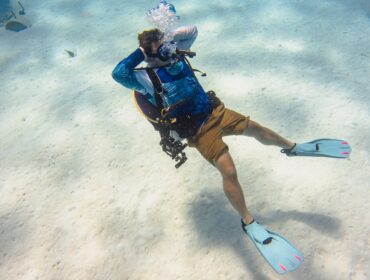It’s a topic that was covered in your initial open water dive training, but how often have you thought about avoiding overexertion while diving? What causes this condition, how can you recognize it, and what can you do to recover?
Overexertion can have a number of causes, including a poor night’s sleep or a lack of rest before a night dive, struggling with your buoyancy or trim, swimming against a current, or kicking too hard. Chasing after a beautifully colored fish or a graceful ray can cause you to exceed your physical limits, increasing your respiration until you find yourself gasping for breath much in the same way as if you’d just run up several flights of stairs.
Begin prevention at the surface. Don’t enter the water winded or tired. We all know squirming into a tight wetsuit can sometimes be a strenuous process, so give yourself a minute to get your breathing to a normal pace and feel at ease. If you’re feeling tense or more nervous than usual, take a step back and pause before hitting the water. Consider what’s making you anxious and whether or not you need to call the dive.
Becoming overexerted during your dive can cause you to struggle to breathe. The faster or more shallow you breathe, the harder it will become, which may cause you to panic or mistakenly think you are out of air. Stop. Get your buddy’s attention. Check your air to be sure you have plenty left. If your pressure is good, take a moment, gently holding onto a stationary object like a rock to keep yourself in place, and take several slow, deep breaths to get your respiration back to normal.
If a rest period solves the problem and you are feeling confident, and you have enough air in your cylinder to continue safely, you can continue your dive. If you feel too tense, head to the surface in a safe manner. Getting on shore or back on the boat safely is paramount over worrying about if you’re spoiling the dive for others.
Keep your safety training in mind. Bolting for the surface or removing your regulator in a panic are sure ways to get yourself into more trouble than you are. Stay calm, stay with your buddy, and trust your training. By mentally reviewing how to handle overexertion, you will be able to respond more automatically during a crisis.




